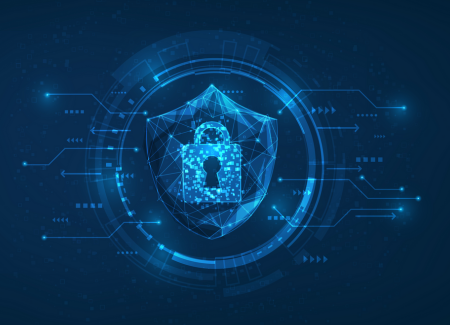Cybersecurity for Beginners: Learn How to Secure Your Data

With the digital revolution in full swing, a strong knowledge of cybersecurity is not just beneficial, it’s a must-have. The digital world is similar to a reservoir of treasures where data is equivalent to precious gems. However, these gems attract not only those with good intentions but also individuals and entities with malicious plans. Hence, for aspiring professionals stepping into the dynamic world of data, codes, and applications, having a sound understanding of diverse aspects of cybersecurity is an absolute necessity. In this article, learn everything about the essentials of cybersecurity for beginners.
In this blog, you will learn:
- What are the Most Important Cybersecurity Skills for Beginners in 2024?
- Digital Threat Landscape Analysis
- Hands-On Technical Skills
- Knowledge of Network Security
- Cyber Hygiene Practices
- Risk Management and Assessment
- Cryptography and Encryption
- Cloud Security Expertise
- Incident Response and Recovery
- Soft Skills and Communication
- Penetration Testing
- How Can Beginners Develop Their Cybersecurity Skills for the Future?
- Frequently Asked Questions About Cybersecurity for Beginners
- Secure Your Future in Cybersecurity With Emeritus
 What are the Most Important Cybersecurity Skills for Beginners in 2024?
What are the Most Important Cybersecurity Skills for Beginners in 2024?
1. Digital Threat Landscape Analysis
Are you a newcomer to the world of cybersecurity? Then, first things first, get the basics right. Cybersecurity for beginners starts with an understanding of the different threats out there, the pitfalls that make systems vulnerable to attacks, and how various forms of cyberattacks, such as Ransomware, Trojan, Spyware, keyloggers, etc., could potentially harm your digital assets. Therefore, cybersecurity for beginners entails building a working knowledge of these essentials.
2. Hands-On Technical Skills
Imagine trying to paint without knowing how to hold a brush; that’s how critical it is to hone technical skills when it comes to cybersecurity, especially for a beginner. You need to be comfortable using the tools and software that will help protect against cyberthreats. Knowledge of tools and software such as Nmap or Wireshark can come in handy as they enable one to perform various tasks essential to cybersecurity.
3. Knowledge of Network Security
Network security is like the immune system of the digital body. Therefore, it’s essential to understand how firewalls, VPNs, and intrusion detection systems work. They help protect networks from malicious attacks. Hence, a working knowledge of it is indispensable for beginners in cybersecurity.
4. Cyber Hygiene Practices
While understanding and mitigating complex threats is essential, many breaches result from overlooking basic hygiene practices. For instance, the WannaCry ransomware attack spread widely due to outdated systems. Beginners should understand the importance of maintaining regular software updates, using multifactor authentication, and regularly backing up data.
5. Risk Management and Assessment
The digital world comes with its own set of pitfalls and risks. Therefore, learning how to identify and efficiently manage these risks is important. It’s about knowing potential threats and crafting innovative strategies to mitigate these risks. Hence, knowledge of essential cybersecurity frameworks such as National Institute of Standards and Technology (NIST) Cybersecurity Framework (CSF) is a must for beginners.
6. Cryptography and Encryption
Cybersecurity experts often have to deal with sensitive data. And this is where the knowledge of cryptography and encryption proves vital. Cryptography is the process of securing information through coding, and encryption is a method of data protection that transmutes data into ciphertext. Hence, being able to navigate these two domains is essential for protecting data and ensuring that confidential information stays confidential.
7. Cloud Security Expertise
Cloud security expertise concerns safeguarding your data, applications, and services that are stored in the cloud from unauthorized access and data breaches. With more data stored in the cloud than ever before, knowing how to protect it is absolutely crucial.
8. Incident Response and Recovery
Things sometimes go wrong, and when they do, you need to know how to respond. Learning how to manage and recover from security incidents is like learning how to put the pieces back together after a catastrophe. It’s a critical skill set that involves planning, quick thinking, and efficient execution. For instance, if a company’s database is under attack, then tools like Splunk or LogRhythm can help you analyze logs and pinpoint the source of a breach. Similarly, if malware attacks a system, tools like Malwarebytes or CrowdStrike Falcon can assist in its removal.
9. Soft Skills and Communication
Technical skills are crucial, but beginners should not discount the importance of soft skills too. Being able to communicate effectively with colleagues and stakeholders is like building bridges in a community. Thus, you must be adept at preparing and delivering captivating presentations to convince your clients or stakeholder. Remember, it’s not just about knowing stuff; it is also about sharing knowledge and working together to build a safer digital environment.
10. Penetration Testing
Knowledge of penetration testing, commonly called ethical hacking, is paramount when it comes to cybersecurity for beginners. Excelling in this domain demands an adept understanding of techniques to unearth and leverage vulnerabilities within systems, networks, and applications. Moreover, grasping typical assault mechanisms like SQL injection, cross-site scripting (XSS), and password deciphering is indispensable.
ALSO READ: Staying Ahead of Cyberthreats: 5 Latest Trends and Best Practices
How Can Beginners Develop Their Cybersecurity Skills for the Future?
Start by learning IT basics and computer networks. Next, acquire detailed knowledge of different operating systems like Windows, Linux, and MacOS. Consider learning a programming language depending on your requirements. For instance, Python can be a good starting point as it is used in many cybersecurity tools. A good grasp of cryptography also helps as it is essential for data protection today. Engage in online cybersecurity courses and take part in concrete exercises such as simulations and capture-the-flag competitions to gain practical experience. Additionally, stay updated through cybersecurity blogs, forums, and social media groups, and converse with experienced professionals and mentors for guidance and insights. Remember, consistent learning and practice can refine your cybersecurity skills for the future.
ALSO READ: Top 9 Highest Paying Cybersecurity Jobs: What’s the Right Fit for You?
 Frequently Asked Questions About Cybersecurity for Beginners
Frequently Asked Questions About Cybersecurity for Beginners
1. Are There Any Specific Certifications or Courses Recommended for Beginners in Cybersecurity?
Cybersecurity for beginners must start with foundational courses. Thus, various certifications like CompTIA or Certified Information Systems Security Professional (CISSP) are some fantastic starting points to consider. Since these courses offer solid groundwork, as they make complex cybersecurity concepts more approachable and navigable for newcomers.
2. What are the Employment Prospects for Individuals With Cybersecurity Skills in 2024?
With the unprecedented expansion of the digital world, the demand for individuals skilled in cybersecurity is undeniably skyrocketing. Various sectors, from finance to health care, are on the lookout for talented professionals to safeguard their digital assets, offering diverse opportunities. As a report by the U.S. Bureau of Labour Statistics suggests, there were millions of job openings for cybersecurity specialists in 2022, and it is projected to increase by 32% over the next decade.
3. How Can Beginners Stay Updated With the Rapidly Evolving Field of Cybersecurity?
Staying updated is crucial in cybersecurity for beginners. Therefore, make sure to always engage with online communities, subscribe to industry journals, and participate in webinars and conferences. Since continuous learning is part of the game, regularly accessing platforms that offer fresh, timely insights and knowledge is absolutely vital. This proactive approach ensures you’re always in the loop and ready to tackle the challenges of the ever-changing cybersecurity landscape.
ALSO READ: What is Cybersecurity and Why is It a Great Career Choice for You
Secure Your Future in Cybersecurity With Emeritus
As the digital landscape keeps evolving, so does the sophistication of cyberthreats. Hence, arming yourself with cutting-edge cybersecurity knowledge is crucial to not only safeguard digital assets but also to thrive in this dynamic field.
Understanding the paramount importance of cybersecurity skills, Emeritus steps in as an ally and guide on this educational journey. Emeritus offers meticulously designed courses on cybersecurity for beginners and professionals. So, join Emeritus’ cybersecurity courses today and step confidently into a future where you’re not just a participant but a leader in cybersecurity.
Write to us at content@emeritus.org





